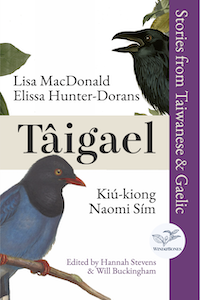Resources
Getting to Grips with Gaelic and Tâi-gí
At Wind&Bones, neither of us are native speakers of either Gaelic or Tâi-gí. But we believe that you don’t need to speak a langauge well, or even at all, to recognise the value and richness this language brings to our communities and both our individual and collective existence.
Nevertheless, as a part of this project, we have been having lots of fun working on learning both languages, and so we thought we would share some of the resources we have been using.
Learning Tâi-gí
- Glossika offer free Tâi-gí language learning resources. LINK
- When we last tested it, National Taiwan Normal University’s Tâi-gí Duolingo clone, Taigiddy, was a bit buggy, and wasn’t ready for the prime-time. But it’s worth having a look around, as it has a cute whale mascot, and when the bugs are ironed out, it should be a lot of fun. LINK
- The best textbooks for English speakers are still the Maryknoll Taiwanese textbooks published in the 1980s. You may be able to track them down online.
- The folks over at Bite-Size Taiwanese do a good job. It’s an easy-going, practical introduction to Tâi-gí. LINK
- YouTube has lots of resources for learning Tâi-gí. For some useful introduction videos in English, head over to A-ióng Tâi-gí, a Tâi-gí advocate from the US. His introductory videos are really useful. LINK
- At Wind&Bones, we’re also big fans of the YouTuber Ayo, and once you have started to find your feet with Tâi-gí, her videos are lots of fun. LINK
Learning Gaelic
- Some people love Duolingo’s famous owl, others fear it. But whatever your opinions on the owl, Duolingo does offer Gaelic for free. LINK
- For those who suffer from strigiformophobia (fear of owls) try Glossika, who also offer Scottish Gaelic for free. LINK
- The Scottish Government’s Speak Gaelic course is really great — and it’s free. We’re working through it now, and so far it feels like a really solid, thorough introduction to the language. LINK
- There are lots of other resources from the Scottish Government on the Learn Gaelic page, so have a look around. LINK
Buy the Book
You can buy the book direct from us, or from any of the places below. For Taiwan customers, if you buy from us direct, we'll send it to your local 7-Eleven!
本書可直接向我們購買,或透過以下通路取得。台灣地區顧客若選擇直接訂購,將為您配送至指定之7-Eleven門市!
Where to Buy | 哪裡購買
Buy Paperback | 購買平裝本
For Taiwan, often the quickest way is to buy direct from Wind&Bones. For the EU, think of using an EU supplier, as ordering from the UK can be complex due to Brexit.
對於台灣的朋友,最快的方式通常是直接向Wind&Bones購買。若您在歐盟地區,建議考慮使用歐盟的供應商,因為從英國下單在英國脫歐後可能會比較複雜
